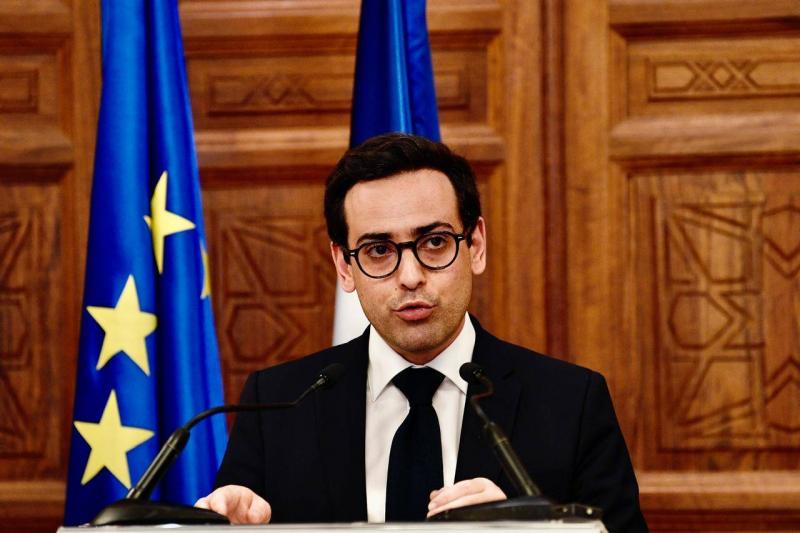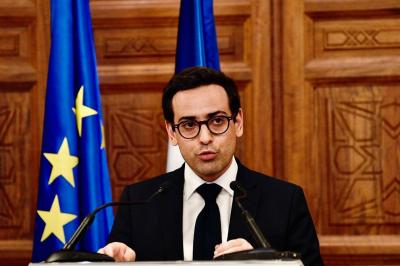French Minister of Europe and Foreign Affairs, Stéphane Sigourney, held a press conference at the Pine Palace at the conclusion of his visit to Lebanon, attended by the Director of the Middle East and North Africa Department at the Ministry of Europe and Foreign Affairs, Anne Grillo, the French Ambassador to Lebanon, Hervé Magro, and a crowd of journalists. Sigourney began by stating: "I am back in the Middle East, and my second tour starts here in Lebanon. A few weeks ago, we talked about escalation, and today escalation is here. France's priority and responsibility is to preserve Lebanon, on behalf of the ties that bind our two countries and peoples, and on behalf of the aspirations of the entire region, as well as what our partners expect from us."
He noted that "the crisis has persisted for too long," saying: "We are working to avoid a regional war from striking Lebanon, and we call on all parties to exercise restraint. We reject the worst-case scenario for Lebanon, which is war. We tell all Lebanese actors they must do everything they can and take responsibility, as Lebanon needs security, functioning institutions, and reforms; the Lebanese citizens demand this."
He added: "We will continue to mobilize our forces fully to help Lebanon emerge from the political, economic, and social crisis it is undergoing. This crisis has lasted too long, and we must prevent a regional war from engulfing Lebanon." Sigourney considered that "the night of April 13-14 was a concerning turning point for all of us, and we send a call to everyone for restraint."
He continued: "We reject the worst-case scenario; in southern Lebanon the war exists even if not referred to by name. Civilians are the ones paying the price, and it is not in anyone's interest for the escalation between Israel and Hezbollah to continue. This is the message I conveyed here to the Prime Minister, the Speaker of the House, and the Army Commander, and this is the message I will send to Israel on Tuesday."
Sigourney remarked: "This morning, I was with the soldiers of the French unit in UNIFIL, and I would like to strongly commend their commitment. UNIFIL plays a crucial role in preventing the worst-case scenario, and all parties should allow UNIFIL to carry out its missions fully. We will continue to support the Lebanese Army alongside our partners; we support it and will continue to do so. The return to stability involves the redeployment of the Lebanese Army in southern Lebanon."
He added, "Finally, we must seize diplomatic opportunities whenever they arise. The goal of the roadmap I proposed in February for the Lebanese and Israeli authorities is to achieve full and comprehensive implementation by all parties of UN Security Council Resolution 1701."
Sigourney stated: "Work is currently underway; a few days ago, President Emmanuel Macron hosted Lebanese Prime Minister Najib Mikati and Army Commander Joseph Aoun in Paris, and he had a call with Speaker Nabih Berri. The Lebanese observations were fully taken into account, and our efforts will not weaken, and consultations will continue. These efforts will yield results, especially if Lebanese institutions are functional. Without an elected president and a fully empowered government, Lebanon will not be invited to the negotiation table, as President Macron stated to the Lebanese Prime Minister a few days ago. There must be real vigilance, and France expresses this firmly and seriously, especially since it stands by Lebanon and the Lebanese."
In response to a question about the amendments proposed to the French paper, Sigourney said, "We have made proposals to all partners, and we will wait for the Israeli response on Tuesday. Therefore, it is difficult for me to answer the question before Tuesday. We have taken the suggestions and amendments from the Lebanese side, and we will do the same for the Israelis. I would like to emphasize that the ongoing matter is not negotiations led by France, but ultimately an agreement must be reached. In any case, we will return to these proposals. I wanted to start my tour here in Lebanon to demonstrate the importance we attach to Lebanon and to show that we stand by it."
Regarding who guarantees Israel's full implementation of UN Resolution 1701, he answered: "Concerning the use of the word escalation, escalation is ongoing and present. If there were no war in Gaza, we would describe what is happening in southern Lebanon as a war, and that is what I observed during my visit to the UNIFIL headquarters this morning. As for our ongoing discussions, we hope they will allow the parties to reach an agreement and provide us with their proposals and responses to our suggestions. We are working for peace, and I know that peace is difficult, and there is a need for diplomatic effort. I believe we are on the right path, and this commitment is suitable for all parties. We will continue our diplomatic efforts because our goal is to achieve peace and avoid igniting the region, but escalation is present."
Regarding the party that is obstructing the presidential elections and whether it could guarantee the implementation of Resolution 1701, he replied: "I have answered this question previously. We are working to have a president, and that is what we are asking for, as there is a need for a president to address several issues that require an institutional framework for resolution. When negotiations occur and when there is peace, all these agreements cannot be implemented without the presence of a Lebanese president. For the sake of Lebanon and its interests and the unity of its territory, we continue to work, but the decision is Lebanese, and it is not for France to dictate who the candidate should be; it is the Lebanese who choose their president."
In response to a question about how France could relieve the burden on Lebanon regarding the issue of Syrian refugees, Minister Sigourney said: "France fully understands that the presence of Syrian refugees is a burden on Lebanon since the beginning of the conflict in Syria. We realize that the issue is very sensitive and that tensions arise from it. France hopes that Syrian refugees will return to their country, and for that, all concerned parties must work to make return possible in a voluntary, safe manner, and in accordance with international law."




